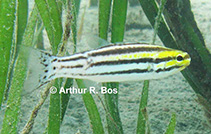| Family: |
Apogonidae (Cardinalfishes), subfamily: Apogoninae |
| Max. size: |
10 cm TL (male/unsexed) |
| Environment: |
reef-associated; marine; depth range 2 - 25 m |
| Distribution: |
Indo-Pacific: Philippines and Indonesia south to Australia and east to Solomon Islands. |
| Diagnosis: |
Dorsal spines (total): 7-7; Dorsal soft rays (total): 9-9; Anal spines: 2-2; Anal soft rays: 8-8. Body with 4 black stripes; uppermost extending from nape along dorsal-fin base to caudal-fin base; stripes broken to dots posteriorly on caudal peduncle and caudal-fin base; the head between stripes yellowish; fins pale. Developed gill rakers on hypobranchial 1-2; on ceratobranchial 8. Preopercular edge usually smooth, sometimes with several weak serrae at angle (Ref. 8525). Mimics Malacanthus species; only close examination reveals the different mouth shape and the apogonid has two separate dorsal fins, whilst the blenny has a long continuous single fin (Ref. 48635). |
| Biology: |
This species is apparently a Batesian mimic of the saber-toothed blenny Meiacanthus grammistes. Observed to swim in open water in a similar fashion as this blenny by using its tail to swim rather than the pectoral fins; but if approached, it quickly swims to the cover of reefs (Ref. 48635). Sexually mature between 6 to 6.5 cm. Solitary or in pairs (Ref 90102). |
| IUCN Red List Status: |
Not Evaluated (N.E.) Ref. (130435)
|
| Threat to humans: |
harmless |
Source and more info: www.fishbase.org. For personal, classroom, and other internal use only. Not for publication.

